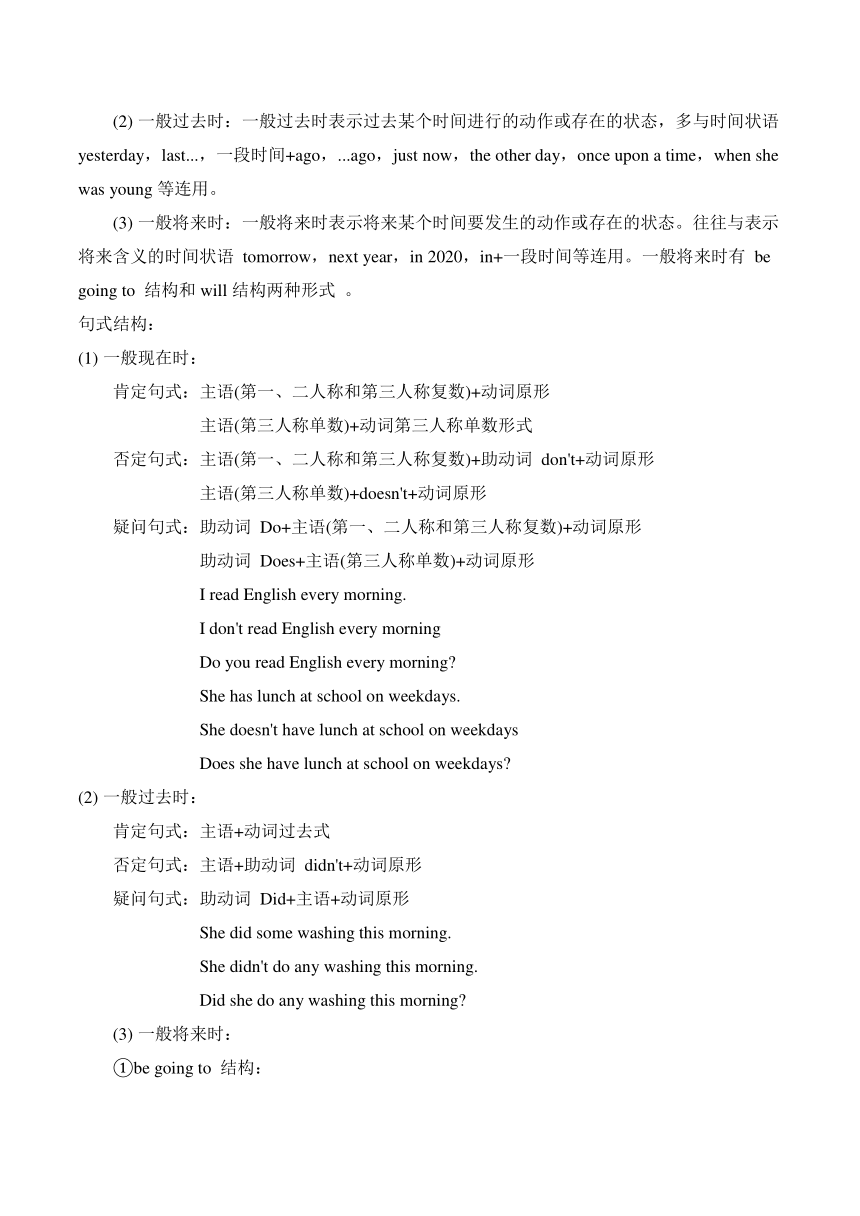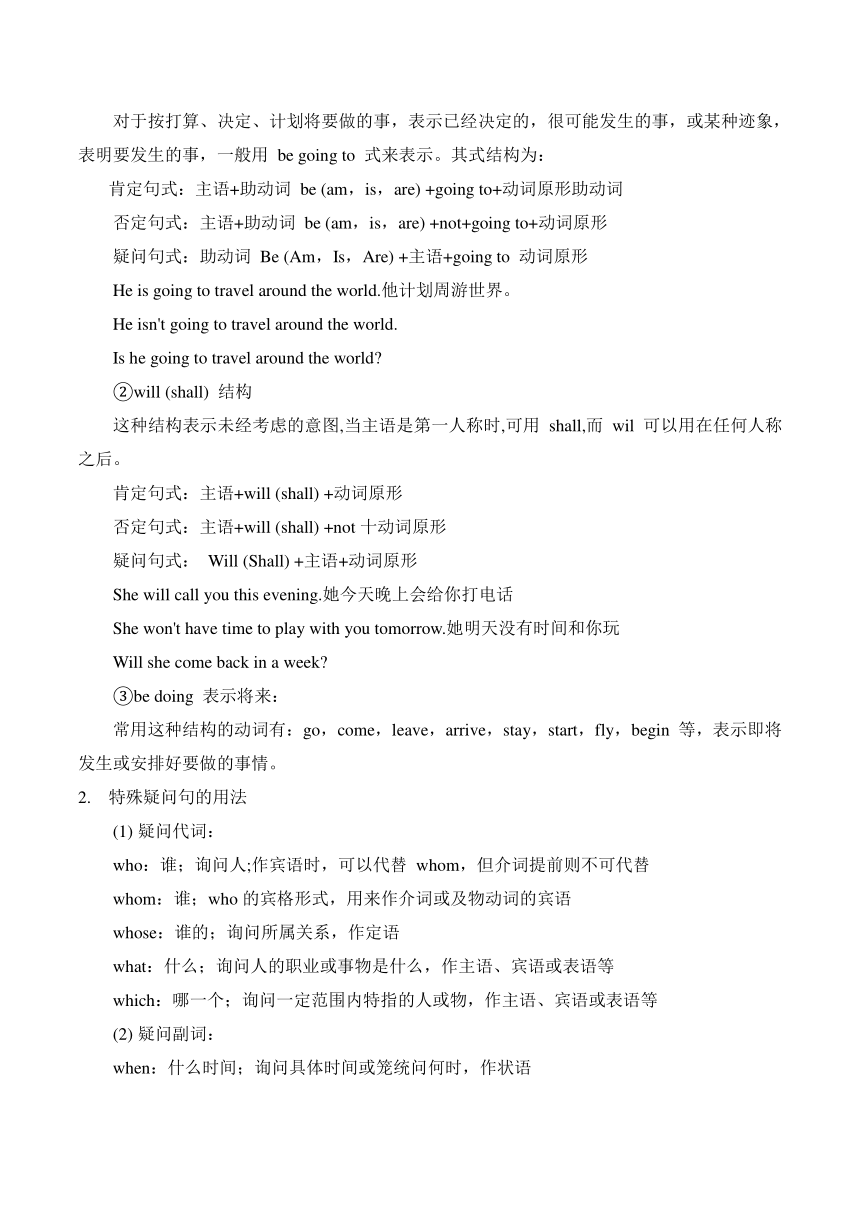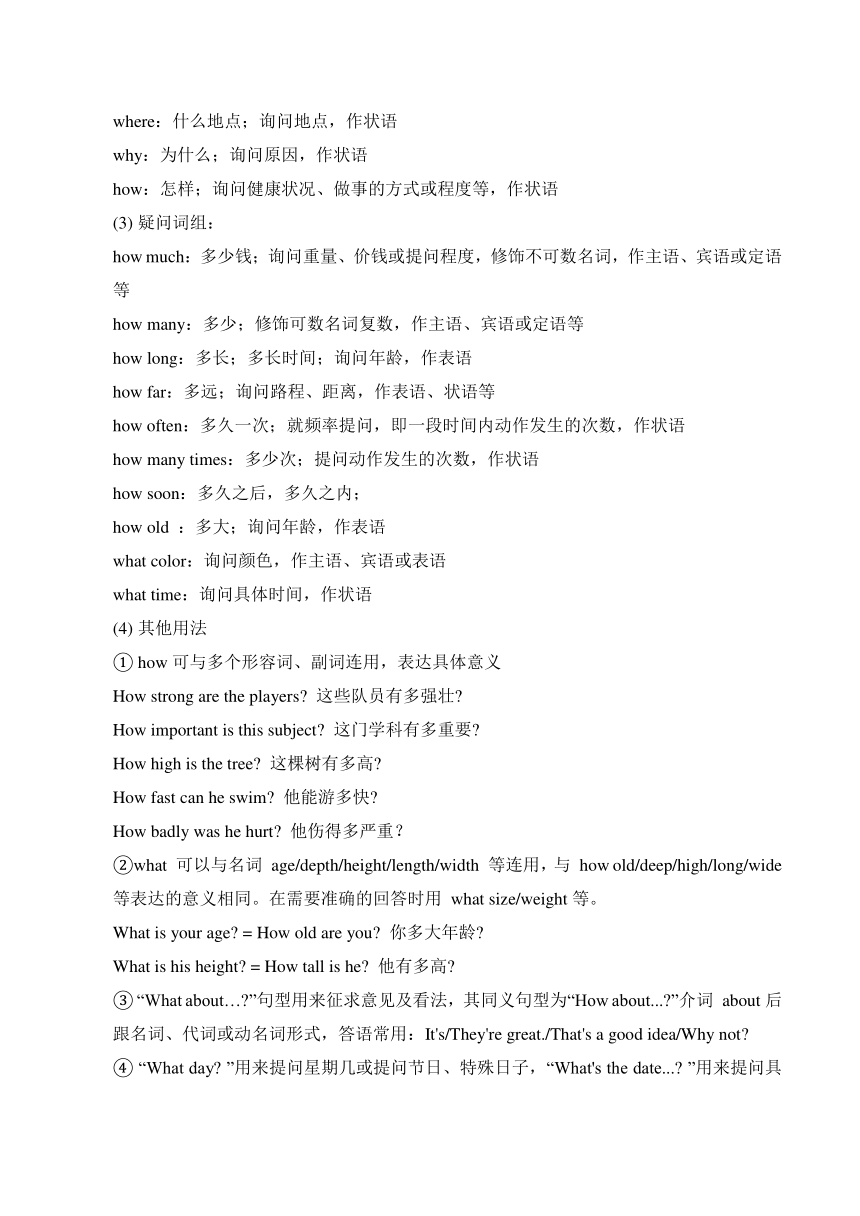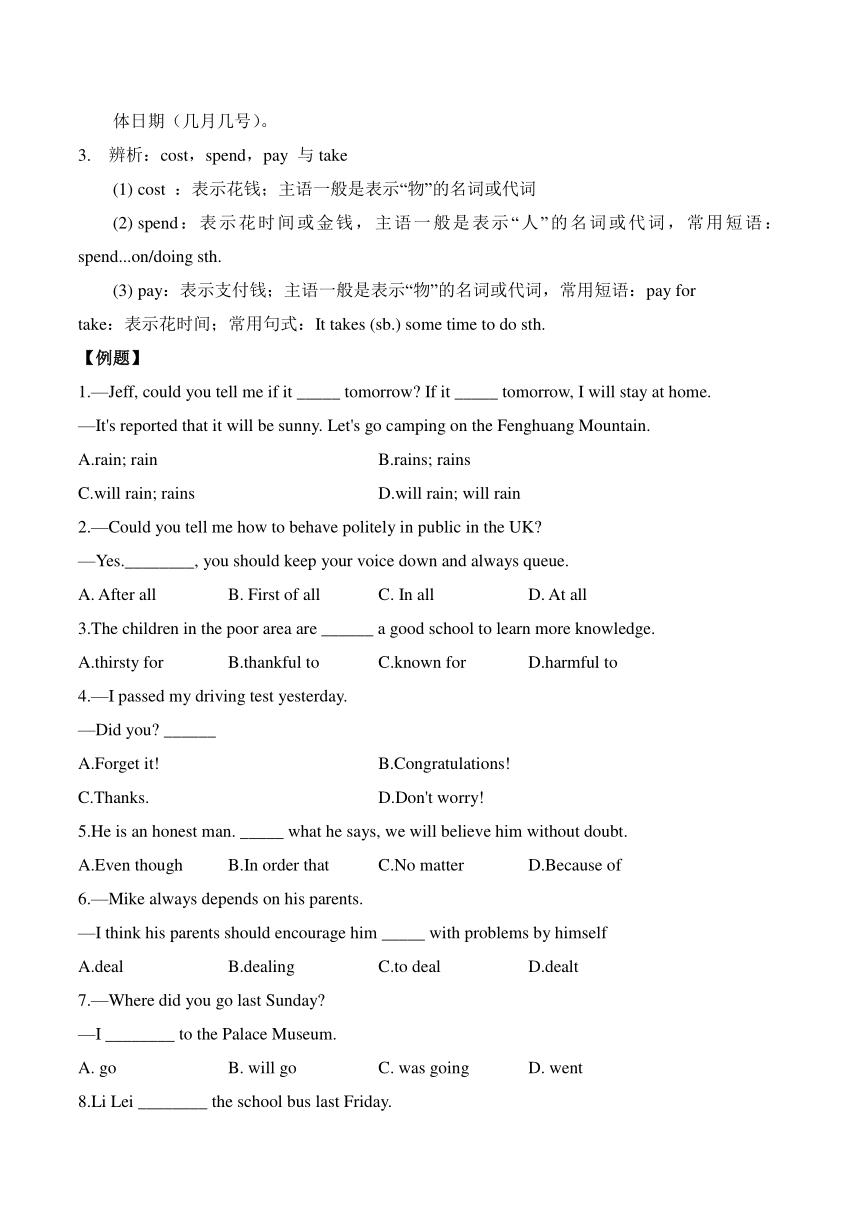Unit 14 I remember meeting all of you in Grade 7期末复习考点讲义及练习(含解析)人教版英语九年级全册
文档属性
| 名称 | Unit 14 I remember meeting all of you in Grade 7期末复习考点讲义及练习(含解析)人教版英语九年级全册 |  | |
| 格式 | docx | ||
| 文件大小 | 202.2KB | ||
| 资源类型 | 教案 | ||
| 版本资源 | 人教新目标(Go for it)版 | ||
| 科目 | 英语 | ||
| 更新时间 | 2024-12-25 08:23:10 | ||
图片预览





文档简介
Unit 14 I remember meeting all of you in Grade 7.期末复习考点讲义
一、学习目标整合
语言能力 能够运用目标句型进行交际,能用一般过去时谈论、分享过去的学校生活经历。
学习能力 能识别文体,根据不同文体实现不同写作目的,提高阅读效率。
文化意识 通过谈论过去的回忆和经历、校园时光和毕业典礼上的演讲,培养学生珍惜过去的时光,从现在做起,追求美好未来的意识。
思维品质 能从不同角度解读语篇,推断语篇的深层含义,作出正确的价值判断。
二、思维导图回顾知识
三、重难知识易混易错
一般现在时,一般过去时与一般将来时
含义:
一般现在时:一般现在时表示经常性的动作或存在的状态,多与时间状语 always,often,sometimes,every day,in the morning,one a week,twice a month 等连用。
一般过去时:一般过去时表示过去某个时间进行的动作或存在的状态,多与时间状语 yesterday,last...,一段时间+ago,...ago,just now,the other day,once upon a time,when she was young等连用。
一般将来时:一般将来时表示将来某个时间要发生的动作或存在的状态。往往与表示将来含义的时间状语 tomorrow,next year,in 2020,in+一段时间等连用。一般将来时有 be going to 结构和will结构两种形式 。
句式结构:
一般现在时:
肯定句式:主语(第一、二人称和第三人称复数)+动词原形
主语(第三人称单数)+动词第三人称单数形式
否定句式:主语(第一、二人称和第三人称复数)+助动词 don't+动词原形
主语(第三人称单数)+doesn't+动词原形
疑问句式:助动词 Do+主语(第一、二人称和第三人称复数)+动词原形
助动词 Does+主语(第三人称单数)+动词原形
I read English every morning.
I don't read English every morning
Do you read English every morning
She has lunch at school on weekdays.
She doesn't have lunch at school on weekdays
Does she have lunch at school on weekdays
一般过去时:
肯定句式:主语+动词过去式
否定句式:主语+助动词 didn't+动词原形
疑问句式:助动词 Did+主语+动词原形
She did some washing this morning.
She didn't do any washing this morning.
Did she do any washing this morning
一般将来时:
①be going to 结构:
对于按打算、决定、计划将要做的事,表示已经决定的,很可能发生的事,或某种迹象,表明要发生的事,一般用 be going to 式来表示。其式结构为:
肯定句式:主语+助动词 be (am,is,are) +going to+动词原形助动词
否定句式:主语+助动词 be (am,is,are) +not+going to+动词原形
疑问句式:助动词 Be (Am,Is,Are) +主语+going to 动词原形
He is going to travel around the world.他计划周游世界。
He isn't going to travel around the world.
Is he going to travel around the world
②will (shall) 结构
这种结构表示未经考虑的意图,当主语是第一人称时,可用 shall,而 wil 可以用在任何人称之后。
肯定句式:主语+will (shall) +动词原形
否定句式:主语+will (shall) +not十动词原形
疑问句式: Will (Shall) +主语+动词原形
She will call you this evening.她今天晚上会给你打电话
She won't have time to play with you tomorrow.她明天没有时间和你玩
Will she come back in a week
③be doing 表示将来:
常用这种结构的动词有:go,come,leave,arrive,stay,start,fly,begin 等,表示即将发生或安排好要做的事情。
特殊疑问句的用法
疑问代词:
who:谁;询问人;作宾语时,可以代替 whom,但介词提前则不可代替
whom:谁;who的宾格形式,用来作介词或及物动词的宾语
whose:谁的;询问所属关系,作定语
what:什么;询问人的职业或事物是什么,作主语、宾语或表语等
which:哪一个;询问一定范围内特指的人或物,作主语、宾语或表语等
疑问副词:
when:什么时间;询问具体时间或笼统问何时,作状语
where:什么地点;询问地点,作状语
why:为什么;询问原因,作状语
how:怎样;询问健康状况、做事的方式或程度等,作状语
疑问词组:
how much:多少钱;询问重量、价钱或提问程度,修饰不可数名词,作主语、宾语或定语等
how many:多少;修饰可数名词复数,作主语、宾语或定语等
how long:多长;多长时间;询问年龄,作表语
how far:多远;询问路程、距离,作表语、状语等
how often:多久一次;就频率提问,即一段时间内动作发生的次数,作状语
how many times:多少次;提问动作发生的次数,作状语
how soon:多久之后,多久之内;
how old :多大;询问年龄,作表语
what color:询问颜色,作主语、宾语或表语
what time:询问具体时间,作状语
其他用法
① how可与多个形容词、副词连用,表达具体意义
How strong are the players 这些队员有多强壮
How important is this subject 这门学科有多重要
How high is the tree 这棵树有多高
How fast can he swim 他能游多快
How badly was he hurt 他伤得多严重?
②what 可以与名词 age/depth/height/length/width 等连用,与 how old/deep/high/long/wide 等表达的意义相同。在需要准确的回答时用 what size/weight等。
What is your age = How old are you 你多大年龄
What is his height = How tall is he 他有多高
③ “What about… ”句型用来征求意见及看法,其同义句型为“How about... ”介词 about后跟名词、代词或动名词形式,答语常用:It's/They're great./That's a good idea/Why not
④ “What day ”用来提问星期几或提问节日、特殊日子,“What's the date... ”用来提问具体日期(几月几号)。
辨析:cost,spend,pay 与take
cost :表示花钱;主语一般是表示“物”的名词或代词
spend:表示花时间或金钱,主语一般是表示“人”的名词或代词,常用短语:spend...on/doing sth.
pay:表示支付钱;主语一般是表示“物”的名词或代词,常用短语:pay for
take:表示花时间;常用句式:It takes (sb.) some time to do sth.
【例题】
1.—Jeff, could you tell me if it _____ tomorrow If it _____ tomorrow, I will stay at home.
—It's reported that it will be sunny. Let's go camping on the Fenghuang Mountain.
A.rain; rain B.rains; rains
C.will rain; rains D.will rain; will rain
2.—Could you tell me how to behave politely in public in the UK
—Yes.________, you should keep your voice down and always queue.
A. After all B. First of all C. In all D. At all
3.The children in the poor area are ______ a good school to learn more knowledge.
A.thirsty for B.thankful to C.known for D.harmful to
4.—I passed my driving test yesterday.
—Did you ______
A.Forget it! B.Congratulations!
C.Thanks. D.Don't worry!
5.He is an honest man. _____ what he says, we will believe him without doubt.
A.Even though B.In order that C.No matter D.Because of
6.—Mike always depends on his parents.
—I think his parents should encourage him _____ with problems by himself
A.deal B.dealing C.to deal D.dealt
7.—Where did you go last Sunday
—I ________ to the Palace Museum.
A. go B. will go C. was going D. went
8.Li Lei ________ the school bus last Friday.
A. misses B. missed C. was missing D. has missed
9.—________ you go to your grandparents’ home every weekend, Lucy
—Yes, and I ________ chickens there last weekend.
A. Do; feed B. Do; fed C. Did; feed D. Did; fed
10.Judy ________ her first prize in chess when she was only six.
A. is winning B. won C. has won D. will win
四、单元核心素养对接中考
1.【2024届·江苏泰州·二模】—I haven’t collected as much money as we expected for the people in need.
—I think you can lower your ________ because at least you’ve tried your best.
A.standard B.speed C.purpose D.value
2.【2024届·江苏泰州·二模】—Who do you think will be chosen to be our new chairperson
—The one who can ________ extra stress and burden.
A.take up B.take off C.take on D.take in
3.【2024届·江苏泰州·二模】 —How do you like the film The Battle at Lake Changjin (《长津湖之战》) —________. I can’t think too highly of it.
A. It is not my cup of tea
B. It’s really wonderful
C. It all depends
D. It’s not the case
4.【2024届·江苏泰州·二模】Children are supposed to learn ________ different subjects ________ good manners, which are helpful to them for their future life.
A.not; but B.either; or
C.not only; but also D.neither; nor
5.【2024届·山东菏泽·一模】—I've never seen Mr Taylor before.
—Don't worry.I ________ him to you before the meeting.
A.will introduce
B.introduced
C.have introduced
6.【2024届·山东菏泽·一模】—A nice handbag! Could you tell me _____
—On Taobao.
A.when you bought it
B.where you will buy it
C.where you bought it
7.【2024届·山东菏泽·一模】—Do your hobbies _____your schoolwork, Paula
—Yes, sometimes. I think I should learn to plan my time carefully.
A.take the place of
B.get in the way of
C.have nothing to do with
8.【2024届·江苏泰州·二模】—How is the case going on
—I’m not sure, but it ________ at this evening’s meeting.
A.will be discussed B.will discuss
C.discussed D.is discussed
9.【2024届·江苏泰州·二模】—To most Chinese parents, children always mean ________.
—Exactly. Parents’ love is the most selfless.
A.everything B.nothing C.something D.anything
10.【2024届·江苏泰州·二模】My father has promised to buy me a new piano. I decide to put it over there, ________ the wall.
A.above B.against C.across D.around
答案以及解析
【例题】
1.答案:C
解析:—Jeff,你能告诉我明天是否有雨吗?如果有雨我就待在家里。—据报道天气晴朗。我们去凤凰山露营吧。第一句if引导宾语从句,由tomorrow可知,用一般将来时;第二句if引导条件状语从句,用一般现在时表示将来。
2.答案:B
解析:考查副词短语。A毕竟.B首先.C总共.D根本.结合语境"—你能告诉我在英国如何在公众场合举止得体吗 —是的,_____,你应该保持低调,总是排队。"可知,应该是"首先",故选:B。
3.答案:A
解析:句意:贫困地区的孩子们渴望一所好学校来学习更多的知识。be thirsty for"渴求,渴望";be thankful to"对……心存感激";be known for"以……闻名";be harmful to"对……有害"。
4.答案:B
解析:—昨天我通过驾照考试了!—你通过了 祝贺你!Forget it意为"不必在意";Congratulations意为"祝贺";Thanks意为"多谢";Don't worry意为"不用担心"。当得知对方通过驾照考试时,我们应该向其表示祝贺。
5.答案:C
解析:句意:他是一个诚实的人。无论他说什么,我们都会毫不怀疑地相信他。no matter"无论",符合句意。
6.答案:C
解析:—迈克总是依赖他的父母。—我认为他的父母应该鼓励他独自处理问题。encourage sb.to do sth."鼓励某人做某事"。
7.答案:D
解析:考查动词的时态。根据“last Sunday”可知,此处应用一般过去时,即谓语动词应用过去式。故选D。
8.答案:B
解析:考查一般过去时。根据时间状语“last Friday”可知,本句是一般过去时,动词用过去式missed。故选B。
9.答案:B
解析:考查动词的时态。根据问句中的“every weekend”可知问句应用一般现在时,故第一个空应用助动词Do;根据答语中的“last weekend”可知第二个空应用feed的过去式fed。所以答案为B。
10.答案:B
解析:考查动词时态。win“获得,赢得”,是动词,根据“when she was only six”可知,此处是一般过去时,动词需用过去式。故选B。
四、单元核心素养对接中考
1.答案: A
解析: 句意:—我没有为有需要的人筹集到我们预期的那么多钱。—我认为你可以降低你的标准,因为至少你已经尽力了。考查名词辨析。standard标准;speed速度;purpose目的;value价值。根据"I think you can lower your ...because at least you’ve tried your best."可知表示我认为你可以降低你的……,因为至少你已经尽力了,因此是降低标准,用standard。故选A。
2.答案: C
解析: 句意:—你认为谁将被选为我们的新主席?—能够承担额外压力和负担的人。考查动词短语辨析。take up开始从事;take off起飞;take on承担;take in吸收。根据"extra stress and burden."可知,这里是能够承担额外压力和负担的人。故选C。
3.答案: B
解析: 句意:—你觉得电影《长津湖之战》怎么样?—真是太精彩了。我对它评价再高也不为过。考查情景交际。It is not my cup of tea这不是我所喜欢的;It’s really wonderful真是好极了;It all depends看情况再说;It’s not the case事实并非如此。根据空格后"I can’t think too highly of it."可知,我对电影的评价非常高,表明我非常喜欢这部电影,因此空格处应是赞美之词。故选B。
4.答案: C
解析: 句意:孩子不但应该学习许多不同的学科,而且还应该学习良好的礼仪。它们对孩子们的未来生活很有帮助。考查连词辨析。not...but...不是……而是;either...or...或者……或者……;not only...but also...不但……而且……;neither...nor...既不……也不……。根据"which are helpful to them for their future life"可知,此处表示学科知识和礼仪都需要学习,故选C。
5.答案: A
解析: 根据语境, 题干第一句表"从未见过Taylor先生", 因此设空处意为打算在会议前介绍给他, introduce动作还未发生, 应用一般将来时态will introduce, 这里will表说话人的意愿。B项是一般过去时态, C项是现在完成时态;均不符合题意。故选:A。
6.答案: C
解析: when you bought it什么时候你买的它;where you will buy it你将在哪里买;where you bought it你在哪里买的。根据下文回答On Taobao. (在淘宝上) 可知, 此处应是询问在哪里买的, 且包已经购买, 因而应为一般过去时, C选项符合语境。故选:C。
7.答案: B
解析: take the place of代替;get in the way of妨碍;have nothing to do with与……无关。根据Yes, sometimes.I think I should learn to plan my time carefully. (是的, 有时会。我认为我应该学会认真规划我的时间。) 可知, 此处是问"波拉, 你的爱好有没有妨碍你的学业?"故选:B。
8.答案: A
解析: 句意:—事情进展如何?—我不确定,但这将在今晚的会议上讨论。考查时态和语态。分析空处所在句的句子结构可知,主语与谓语之间为逻辑上的动宾关系,应用被动语态;根据空后"at this evening’s meeting"可知,此处指将来发生的动作,应用一般将来时的被动语态"will be done",故选A。
9.答案: A
解析: 句意:—对于大部分中国父母,孩子总是意味着一切。—确实是。父母的爱是最无私的。考查复合不定代词的用法。everything一切;nothing什么都没有;something某事;anything任何事。根据"Parents’ love is the most selfless."可知此处指对于父母来说,孩子意味着一切,应用"everything"。故选A。
10.答案: B
解析: 句意:我父亲答应给我买一架新的钢琴。我决定把它放在那儿,靠墙。考查介词辨析。above在……上面;against倚,靠;across穿过;around围绕。根据"My father has promised to buy me a new piano."及"the wall"可知,此处是指将钢琴靠着墙。故选B。
一、学习目标整合
语言能力 能够运用目标句型进行交际,能用一般过去时谈论、分享过去的学校生活经历。
学习能力 能识别文体,根据不同文体实现不同写作目的,提高阅读效率。
文化意识 通过谈论过去的回忆和经历、校园时光和毕业典礼上的演讲,培养学生珍惜过去的时光,从现在做起,追求美好未来的意识。
思维品质 能从不同角度解读语篇,推断语篇的深层含义,作出正确的价值判断。
二、思维导图回顾知识
三、重难知识易混易错
一般现在时,一般过去时与一般将来时
含义:
一般现在时:一般现在时表示经常性的动作或存在的状态,多与时间状语 always,often,sometimes,every day,in the morning,one a week,twice a month 等连用。
一般过去时:一般过去时表示过去某个时间进行的动作或存在的状态,多与时间状语 yesterday,last...,一段时间+ago,...ago,just now,the other day,once upon a time,when she was young等连用。
一般将来时:一般将来时表示将来某个时间要发生的动作或存在的状态。往往与表示将来含义的时间状语 tomorrow,next year,in 2020,in+一段时间等连用。一般将来时有 be going to 结构和will结构两种形式 。
句式结构:
一般现在时:
肯定句式:主语(第一、二人称和第三人称复数)+动词原形
主语(第三人称单数)+动词第三人称单数形式
否定句式:主语(第一、二人称和第三人称复数)+助动词 don't+动词原形
主语(第三人称单数)+doesn't+动词原形
疑问句式:助动词 Do+主语(第一、二人称和第三人称复数)+动词原形
助动词 Does+主语(第三人称单数)+动词原形
I read English every morning.
I don't read English every morning
Do you read English every morning
She has lunch at school on weekdays.
She doesn't have lunch at school on weekdays
Does she have lunch at school on weekdays
一般过去时:
肯定句式:主语+动词过去式
否定句式:主语+助动词 didn't+动词原形
疑问句式:助动词 Did+主语+动词原形
She did some washing this morning.
She didn't do any washing this morning.
Did she do any washing this morning
一般将来时:
①be going to 结构:
对于按打算、决定、计划将要做的事,表示已经决定的,很可能发生的事,或某种迹象,表明要发生的事,一般用 be going to 式来表示。其式结构为:
肯定句式:主语+助动词 be (am,is,are) +going to+动词原形助动词
否定句式:主语+助动词 be (am,is,are) +not+going to+动词原形
疑问句式:助动词 Be (Am,Is,Are) +主语+going to 动词原形
He is going to travel around the world.他计划周游世界。
He isn't going to travel around the world.
Is he going to travel around the world
②will (shall) 结构
这种结构表示未经考虑的意图,当主语是第一人称时,可用 shall,而 wil 可以用在任何人称之后。
肯定句式:主语+will (shall) +动词原形
否定句式:主语+will (shall) +not十动词原形
疑问句式: Will (Shall) +主语+动词原形
She will call you this evening.她今天晚上会给你打电话
She won't have time to play with you tomorrow.她明天没有时间和你玩
Will she come back in a week
③be doing 表示将来:
常用这种结构的动词有:go,come,leave,arrive,stay,start,fly,begin 等,表示即将发生或安排好要做的事情。
特殊疑问句的用法
疑问代词:
who:谁;询问人;作宾语时,可以代替 whom,但介词提前则不可代替
whom:谁;who的宾格形式,用来作介词或及物动词的宾语
whose:谁的;询问所属关系,作定语
what:什么;询问人的职业或事物是什么,作主语、宾语或表语等
which:哪一个;询问一定范围内特指的人或物,作主语、宾语或表语等
疑问副词:
when:什么时间;询问具体时间或笼统问何时,作状语
where:什么地点;询问地点,作状语
why:为什么;询问原因,作状语
how:怎样;询问健康状况、做事的方式或程度等,作状语
疑问词组:
how much:多少钱;询问重量、价钱或提问程度,修饰不可数名词,作主语、宾语或定语等
how many:多少;修饰可数名词复数,作主语、宾语或定语等
how long:多长;多长时间;询问年龄,作表语
how far:多远;询问路程、距离,作表语、状语等
how often:多久一次;就频率提问,即一段时间内动作发生的次数,作状语
how many times:多少次;提问动作发生的次数,作状语
how soon:多久之后,多久之内;
how old :多大;询问年龄,作表语
what color:询问颜色,作主语、宾语或表语
what time:询问具体时间,作状语
其他用法
① how可与多个形容词、副词连用,表达具体意义
How strong are the players 这些队员有多强壮
How important is this subject 这门学科有多重要
How high is the tree 这棵树有多高
How fast can he swim 他能游多快
How badly was he hurt 他伤得多严重?
②what 可以与名词 age/depth/height/length/width 等连用,与 how old/deep/high/long/wide 等表达的意义相同。在需要准确的回答时用 what size/weight等。
What is your age = How old are you 你多大年龄
What is his height = How tall is he 他有多高
③ “What about… ”句型用来征求意见及看法,其同义句型为“How about... ”介词 about后跟名词、代词或动名词形式,答语常用:It's/They're great./That's a good idea/Why not
④ “What day ”用来提问星期几或提问节日、特殊日子,“What's the date... ”用来提问具体日期(几月几号)。
辨析:cost,spend,pay 与take
cost :表示花钱;主语一般是表示“物”的名词或代词
spend:表示花时间或金钱,主语一般是表示“人”的名词或代词,常用短语:spend...on/doing sth.
pay:表示支付钱;主语一般是表示“物”的名词或代词,常用短语:pay for
take:表示花时间;常用句式:It takes (sb.) some time to do sth.
【例题】
1.—Jeff, could you tell me if it _____ tomorrow If it _____ tomorrow, I will stay at home.
—It's reported that it will be sunny. Let's go camping on the Fenghuang Mountain.
A.rain; rain B.rains; rains
C.will rain; rains D.will rain; will rain
2.—Could you tell me how to behave politely in public in the UK
—Yes.________, you should keep your voice down and always queue.
A. After all B. First of all C. In all D. At all
3.The children in the poor area are ______ a good school to learn more knowledge.
A.thirsty for B.thankful to C.known for D.harmful to
4.—I passed my driving test yesterday.
—Did you ______
A.Forget it! B.Congratulations!
C.Thanks. D.Don't worry!
5.He is an honest man. _____ what he says, we will believe him without doubt.
A.Even though B.In order that C.No matter D.Because of
6.—Mike always depends on his parents.
—I think his parents should encourage him _____ with problems by himself
A.deal B.dealing C.to deal D.dealt
7.—Where did you go last Sunday
—I ________ to the Palace Museum.
A. go B. will go C. was going D. went
8.Li Lei ________ the school bus last Friday.
A. misses B. missed C. was missing D. has missed
9.—________ you go to your grandparents’ home every weekend, Lucy
—Yes, and I ________ chickens there last weekend.
A. Do; feed B. Do; fed C. Did; feed D. Did; fed
10.Judy ________ her first prize in chess when she was only six.
A. is winning B. won C. has won D. will win
四、单元核心素养对接中考
1.【2024届·江苏泰州·二模】—I haven’t collected as much money as we expected for the people in need.
—I think you can lower your ________ because at least you’ve tried your best.
A.standard B.speed C.purpose D.value
2.【2024届·江苏泰州·二模】—Who do you think will be chosen to be our new chairperson
—The one who can ________ extra stress and burden.
A.take up B.take off C.take on D.take in
3.【2024届·江苏泰州·二模】 —How do you like the film The Battle at Lake Changjin (《长津湖之战》) —________. I can’t think too highly of it.
A. It is not my cup of tea
B. It’s really wonderful
C. It all depends
D. It’s not the case
4.【2024届·江苏泰州·二模】Children are supposed to learn ________ different subjects ________ good manners, which are helpful to them for their future life.
A.not; but B.either; or
C.not only; but also D.neither; nor
5.【2024届·山东菏泽·一模】—I've never seen Mr Taylor before.
—Don't worry.I ________ him to you before the meeting.
A.will introduce
B.introduced
C.have introduced
6.【2024届·山东菏泽·一模】—A nice handbag! Could you tell me _____
—On Taobao.
A.when you bought it
B.where you will buy it
C.where you bought it
7.【2024届·山东菏泽·一模】—Do your hobbies _____your schoolwork, Paula
—Yes, sometimes. I think I should learn to plan my time carefully.
A.take the place of
B.get in the way of
C.have nothing to do with
8.【2024届·江苏泰州·二模】—How is the case going on
—I’m not sure, but it ________ at this evening’s meeting.
A.will be discussed B.will discuss
C.discussed D.is discussed
9.【2024届·江苏泰州·二模】—To most Chinese parents, children always mean ________.
—Exactly. Parents’ love is the most selfless.
A.everything B.nothing C.something D.anything
10.【2024届·江苏泰州·二模】My father has promised to buy me a new piano. I decide to put it over there, ________ the wall.
A.above B.against C.across D.around
答案以及解析
【例题】
1.答案:C
解析:—Jeff,你能告诉我明天是否有雨吗?如果有雨我就待在家里。—据报道天气晴朗。我们去凤凰山露营吧。第一句if引导宾语从句,由tomorrow可知,用一般将来时;第二句if引导条件状语从句,用一般现在时表示将来。
2.答案:B
解析:考查副词短语。A毕竟.B首先.C总共.D根本.结合语境"—你能告诉我在英国如何在公众场合举止得体吗 —是的,_____,你应该保持低调,总是排队。"可知,应该是"首先",故选:B。
3.答案:A
解析:句意:贫困地区的孩子们渴望一所好学校来学习更多的知识。be thirsty for"渴求,渴望";be thankful to"对……心存感激";be known for"以……闻名";be harmful to"对……有害"。
4.答案:B
解析:—昨天我通过驾照考试了!—你通过了 祝贺你!Forget it意为"不必在意";Congratulations意为"祝贺";Thanks意为"多谢";Don't worry意为"不用担心"。当得知对方通过驾照考试时,我们应该向其表示祝贺。
5.答案:C
解析:句意:他是一个诚实的人。无论他说什么,我们都会毫不怀疑地相信他。no matter"无论",符合句意。
6.答案:C
解析:—迈克总是依赖他的父母。—我认为他的父母应该鼓励他独自处理问题。encourage sb.to do sth."鼓励某人做某事"。
7.答案:D
解析:考查动词的时态。根据“last Sunday”可知,此处应用一般过去时,即谓语动词应用过去式。故选D。
8.答案:B
解析:考查一般过去时。根据时间状语“last Friday”可知,本句是一般过去时,动词用过去式missed。故选B。
9.答案:B
解析:考查动词的时态。根据问句中的“every weekend”可知问句应用一般现在时,故第一个空应用助动词Do;根据答语中的“last weekend”可知第二个空应用feed的过去式fed。所以答案为B。
10.答案:B
解析:考查动词时态。win“获得,赢得”,是动词,根据“when she was only six”可知,此处是一般过去时,动词需用过去式。故选B。
四、单元核心素养对接中考
1.答案: A
解析: 句意:—我没有为有需要的人筹集到我们预期的那么多钱。—我认为你可以降低你的标准,因为至少你已经尽力了。考查名词辨析。standard标准;speed速度;purpose目的;value价值。根据"I think you can lower your ...because at least you’ve tried your best."可知表示我认为你可以降低你的……,因为至少你已经尽力了,因此是降低标准,用standard。故选A。
2.答案: C
解析: 句意:—你认为谁将被选为我们的新主席?—能够承担额外压力和负担的人。考查动词短语辨析。take up开始从事;take off起飞;take on承担;take in吸收。根据"extra stress and burden."可知,这里是能够承担额外压力和负担的人。故选C。
3.答案: B
解析: 句意:—你觉得电影《长津湖之战》怎么样?—真是太精彩了。我对它评价再高也不为过。考查情景交际。It is not my cup of tea这不是我所喜欢的;It’s really wonderful真是好极了;It all depends看情况再说;It’s not the case事实并非如此。根据空格后"I can’t think too highly of it."可知,我对电影的评价非常高,表明我非常喜欢这部电影,因此空格处应是赞美之词。故选B。
4.答案: C
解析: 句意:孩子不但应该学习许多不同的学科,而且还应该学习良好的礼仪。它们对孩子们的未来生活很有帮助。考查连词辨析。not...but...不是……而是;either...or...或者……或者……;not only...but also...不但……而且……;neither...nor...既不……也不……。根据"which are helpful to them for their future life"可知,此处表示学科知识和礼仪都需要学习,故选C。
5.答案: A
解析: 根据语境, 题干第一句表"从未见过Taylor先生", 因此设空处意为打算在会议前介绍给他, introduce动作还未发生, 应用一般将来时态will introduce, 这里will表说话人的意愿。B项是一般过去时态, C项是现在完成时态;均不符合题意。故选:A。
6.答案: C
解析: when you bought it什么时候你买的它;where you will buy it你将在哪里买;where you bought it你在哪里买的。根据下文回答On Taobao. (在淘宝上) 可知, 此处应是询问在哪里买的, 且包已经购买, 因而应为一般过去时, C选项符合语境。故选:C。
7.答案: B
解析: take the place of代替;get in the way of妨碍;have nothing to do with与……无关。根据Yes, sometimes.I think I should learn to plan my time carefully. (是的, 有时会。我认为我应该学会认真规划我的时间。) 可知, 此处是问"波拉, 你的爱好有没有妨碍你的学业?"故选:B。
8.答案: A
解析: 句意:—事情进展如何?—我不确定,但这将在今晚的会议上讨论。考查时态和语态。分析空处所在句的句子结构可知,主语与谓语之间为逻辑上的动宾关系,应用被动语态;根据空后"at this evening’s meeting"可知,此处指将来发生的动作,应用一般将来时的被动语态"will be done",故选A。
9.答案: A
解析: 句意:—对于大部分中国父母,孩子总是意味着一切。—确实是。父母的爱是最无私的。考查复合不定代词的用法。everything一切;nothing什么都没有;something某事;anything任何事。根据"Parents’ love is the most selfless."可知此处指对于父母来说,孩子意味着一切,应用"everything"。故选A。
10.答案: B
解析: 句意:我父亲答应给我买一架新的钢琴。我决定把它放在那儿,靠墙。考查介词辨析。above在……上面;against倚,靠;across穿过;around围绕。根据"My father has promised to buy me a new piano."及"the wall"可知,此处是指将钢琴靠着墙。故选B。
同课章节目录
- Unit 1 How can we become good learners.
- Section A
- Section B
- Unit 2 I think that mooncakes are delicious!
- Section A
- Section B
- Unit 3 Could you please tell me where the restroom
- Section A
- Section B
- Unit 4 I used to be afraid of the dark.
- Section A
- Section B
- Unit 5 What are the shirts made of?
- Section A
- Section B
- Review of Units 1-5
- Unit 6 When was it invented?
- Section A
- Section B
- Unit 7 Teenagers should be allowed to choose their
- Section A
- Section B
- Unit 8 It must belong to Carla.
- Section A
- Section B
- Unit 9 I like music that I can dance to.
- Section A
- Section B
- Unit 10 You're supposed to shake hands.
- Section A
- Section B
- Review of Units 6-10
- Unit 11 Sad movies make me cry.
- Section A
- Section B
- Unit 12 Life is full of the unexpected
- Section A
- Section B
- Unit 13 We're trying to save the earth!
- Section A
- Section B
- Unit 14 I remember meeting all of you in Grade 7.
- Section A
- Section B
- Review of Units 11-14
